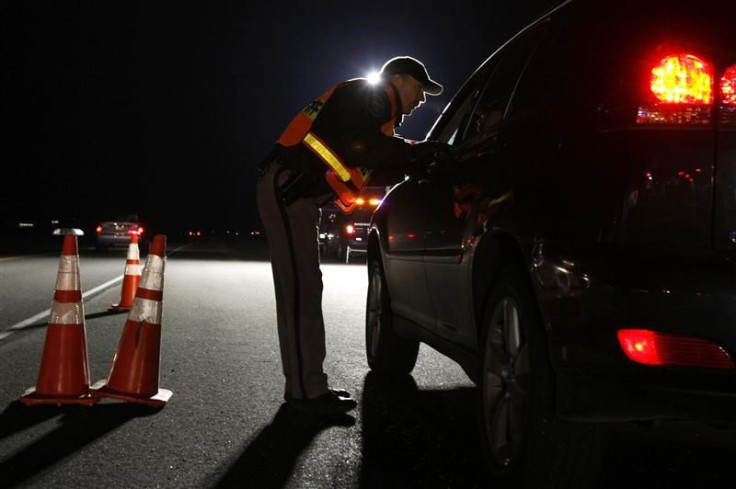Supreme Court to Address Blood Testing for Drunk Driving

The Supreme Court will soon consider whether police must get a warrant before forcing a suspected drunken driver to submit to a blood test, a case that could set a new legal standard for motorists' privacy.
By agreeing on Tuesday to hear the case along with six others, the court has agreed to review close to 40 cases for the nine-month term that begins on Monday.
It will add others in months to come and typically hears 70 to 75 cases a year. Decisions are expected by the end of June.
In the blood-test case, police in the state of Missouri argued they should not have to wait for approval to draw blood given how quickly alcohol dissipates in the bloodstream.
The state's highest court rejected that argument in a January 17 decision, saying the test violated the Fourth Amendment of the U.S. Constitution, which protects against unreasonable searches and seizures.
According to the FBI, about 1.41 million people were arrested in the United States in 2010 for driving under the influence.
About 28 people die each day in the United States as a result of drunken driving crashes, according to National Highway Traffic Safety Administration data.
Lewis Katz, a criminal justice specialist at Case Western Reserve University School of Law in Cleveland, said a decision against Missouri could upend a longstanding practice by police to help thwart drunken driving.
"The Supreme Court has generally in the last four decades been sympathetic to police claims in this area of warrants, but this is an entirely different area because of the intrusion into the body," Katz said. "Invasion of the body is the greatest invasion of privacy there could be."
BLOOD SAMPLE
Tyler McNeely had been pulled over for speeding just after 2 a.m. on October 3, 2010, by a Missouri highway patrolman, who then took him to a nearby hospital. A technician measured McNeely's blood-alcohol content at 0.154 percent, nearly twice the legal limit, roughly 25 minutes after he had been pulled over.
The Missouri Supreme Court agreed with McNeely that the blood sample should be suppressed, finding that there were no "special facts" or "exigent circumstances" to justify obtaining it in a hurry.
Courts have split over whether the natural, rapid dissipation of alcohol in the bloodstream, typically 0.015 percent to 0.020 percent an hour, creates enough urgency to allow the warrantless drawing of blood.
Missouri argued that the state Supreme Court misinterpreted a 1966 U.S. Supreme Court precedent that upheld the warrantless drawing of blood from a man who had recently been in a car accident. The U.S. Supreme Court said that "special facts" justified that search.
McNeely is represented by the American Civil Liberties Union. In court papers, he said at least 27 U.S. states had laws banning the warrantless, nonconsensual drawing of blood.
GABELLI; WEST VIRGINIA
The Supreme Court also agreed to consider an appeal by fund manager Marc Gabelli, a son of famed investor Mario Gabelli, who accused the Securities and Exchange Commission of waiting too long to bring a civil case relating to so-called market timing.
Marc Gabelli, a former portfolio manager at Gabelli Funds LLC, and Bruce Alpert, a chief operating officer for the firm, were accused by the regulator of letting a British firm secretly conduct hundreds of market-timing trades in the Gabelli Global Growth Fund between 1999 and 2002.
The SEC did not sue until April 2008, which Gabelli and Alpert said was beyond the five-year statute of limitations since the last suspect trade had taken place, in August 2002.
A federal appeals court saw no problem with the delay, saying the SEC would have had no reason to uncover the matter prior to September 2003, when then-New York Attorney General Eliot Spitzer announced an industrywide probe into the practice.
Market timing involves rapid trading in violation of funds' rules, and at the expense of ordinary investors who lack the privilege.
In a separate decision, the Supreme Court also overturned a lower court order that had thrown out West Virginia's congressional redistricting map, which opponents claimed did not treat all votes equally.
The Supreme Court said a federal district court panel erred in striking down a redistricting map that critics said allowed too much variation in the population of various districts, and also devalued the votes of people in the state's faster-growing Eastern Panhandle.
In an unsigned opinion, the Supreme Court said the panel failed to give deference to West Virginia's legitimate reasons for drawing the map, including a desire not to split counties between districts, and to avoid pitting incumbents against each other. The state has three congressional districts.
Other cases the Supreme Court agreed to decide:
- Whether the federal government can claim immunity over the alleged sexual assault of an inmate by three guards at a prison in Lewisburg, Pennsylvania.
- Whether lawyers could obtain personal information about drivers from state motor vehicle records, with a goal of trying to find plaintiffs to pursue litigation.
- Whether medical personnel in the military are entitled to immunity, in a case involving an alleged "battery" over an eye surgery procedure that did not go as planned.
- Whether a state has power to recover money it spent on Medicaid payments to victims of negligence and other private wrongs known as torts, when the recipients also recover from an outside source.



























